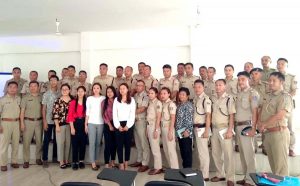
Eastern Mirror Desk
Dimapur, July 29: Thirty-seven years since the branch was established by the then Chief Minister JB Jasokie in 1982, the contribution of forensic science towards crime investigation in Nagaland remains, at the very least, open to question.
Unlike its NE sister-states—especially Mizoram, Meghalaya, and Manipur—Nagaland’s Forensic Science Laboratory (FSL) located at Kachari Gaon in Dimapur is far from full fledged; with facilities only for fingerprint analysis, polygraph, forensic photography and narcotics testing (only for cannabis), according to a source from FSL.
Instances of police solving crime cases, or convicting criminals, though forensic evidence or data in Nagaland are extremely rare, said a top official of Dimapur police on Monday. “The fact that I have to actually think hard about it, shows how rare it is.”
Though the district police have allocated ‘investigation tool kit’ to every police station, they are very basic devices, the official said. For fingerprint identification or narcotics testing, they submit the samples to the FSL in Dimapur; for electronic/cyber forensic, the samples/items are sent to the National Institute of Electronics and Information Technology, Kohima.
Everything else, in crime investigation, is sent to forensic labs outside the state, the official said. “When we send outside, it takes a lot of time for them to give the result. They don’t prioritise our cases and ultimately there is undue delay which, in investigation, is a huge impediment.”
It was in this context that the Naga Forensic Science Association, formed in 2018 by a group of students with specialisation in various forensic branches, conducted a two-hour-long session about forensic science in crime investigation with the ACPs, officers-in-charge and investigating officers of all police stations in Dimapur on Monday.
The topics covered were: crime scene investigation by Puleno Kennao; collection and preservation of evidence by Vetolü P Tunyi; fingerprint, and security features in currency notes by Kimeri Ngullie; forensic document examination by Vicheno Kera; and forensic DNA analysis by Lanujungla Imsong.
As succinctly put by one of the association’s members: “Even without the equipments, having the knowledge itself is no bad thing.”
After a lively interactive session, a seemingly impressed team of investigators wondered aloud if the association could provide consultancy service and aid the police in crime investigation.
According to a police official, the FSL is currently under-staffed. “We (police) do have the basic knowledge and kits but there is nothing like having such expertise, with specialised people. It will improve the quality as well as the pace of investigation.”
The suggestion from the association was that every district could have two forensic assistants to aid the police in investigation. In Nagaland, there are enough qualified and skilled forensic students, some even with PhD as well as the experience of having work at forensic labs in other states, the members said.
There is also a need to spread awareness among the public that they should not contaminate or disturb crime scenes, they added. The association had conducted a similar seminar at Kohima recently.
While inaugurating the revamped FSL at Kachari Gaon in September last year, the home minister had expressed ‘hope’ that the addition of five new units – lie detector (polygraph), cyber forensic, forensic document examination, ballistic, and serology and biology – would boost crime investigation in the state.
While hope springs eternal, perhaps the commitment warrants a forensic examination of its own.

